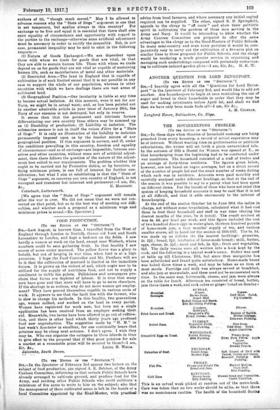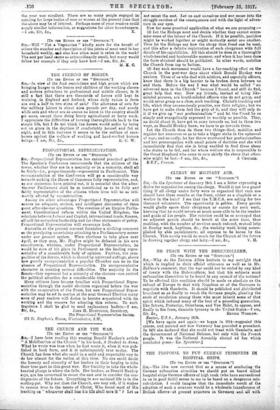THE HOUSEKEEPING PROBLEM.
[To viz EDITOR OP THE " SPECTLTOR."1 Sta,—In these days when theories of household economy are being preached from every housetop, a record of actual experience may be of interest. Without wasting time on preliminaries or patriotic exhortations, the writer will set forth a plain unvarnished tale. In the autumn of 1915 a Hostel for Women was opened at X., so that housekeeping from the beginning had to be conducted under war conditions. The household consisted of a staff of twelve and an average of forty-three residents. The figures given below, however, are not based on vague averages, but on a strict record of the number of people fed and the exact number of weeks during which each was in residence. Accounts were paid monthly and carefully analysed under different headings, so that at the end of the session it was possible to say to a penny what had been spent on different items. For the benefit of those who have not tried this system of keeping household accounts it may be said that it is not at all difficult, and that it adds enormously to the interest of housekeeping.
At the end of the session October 1st to June 30th the ladies in charge, not without some trepidation, calculated what it had cost them to feed their household and staff in war time (during the dearest months of the year, 'be it noted). The result arrived at was 8s. 5d. per head per week, and this figure included the cost of two hundred dozen eggs in water-glass, thirteen hundred pounds of home-made jam, a four months' supply of tea, and various smaller stores, all in hand for the session of 1916-1917. The 8s. 5d. was made up as follows (to the nearest farthing): groceries, 2s. nd., bread, 5id. (exclusive of home-made bread); milk, butter, eggs, cheese, 2s. 50.; meat and fish, 2a. 81d.; fruit and vegetables, 6id. The daily menus were all written into a book kept by the cook, and the following is a typical week's menu. Butter was used at table up till Christmas, 1915, but since then margarine has been substituted and found quite satisfactory. Home-made bread was baked three times a week, and may be taken as an item at most meals. Porridge and milk was always served at breakfast, and also jam or marmalade, and these need not be enumerated each time. In the same way, buttermilk, cheese, and jam were always on the table for lunch. Afternoon tea consisted of bread, butter, jam three times a week, and rock cakes or ginger bread on Sunday s
SUNDAY.
Breakfast. Dueler.
Sausages. Brown Soup. Roast Beef.
Rolled Onions and Slums. Ben Rhyddlag Pudding.
Luncheon.
MONDAY.. Shepherd's Pie. Bread, Cheese, Jam.
TUESDAY. Vegetable Vieth. Milk--Pudding. , WEDNESDAY.
Scrambled zags on Toast. Potted Herring.
Milk Pudding.
THURSDAY.
Relantfae of Beef. Lentil Soup.
Stewed Figs.
FRIDAY.
Fish Pls. Cheese and Potato Pie. Haricot Mutton.
Bread and Jam. Plum Dug.
Moe Pudding.
SATURDAY.
Coll Ham Brown Soup. Stewed Steak and Vegetables.
Milk Pudding. Castle Puddings.
This is an actual week picked at random out of the menu-book. Care was taken that no two weeks should be alike, so that there was no monotonous routine. The health of the household during
Breakfast.
Friel Raeon and Bread. Dolled Ham. Supper.
Cold Meat. Salad. Fig Custards.
Demos Ragout of Rabbit. Boiled Cabbage. Delaware Pudding.
Moe Soup. Cold-bleat. Salad. Apple Charlotte.
Potato Soup.
Fried Pork Fillets. Apple /knee. Vegetables.
Stewed Prunes.
• Salt Round of Best with Carrot, Turnip and Colon. Retuned Puodtng. Milk Pudding.
the year was excellent. There are so many people engaged. in. catering for large bodies of men or women at the present time that the abore may be of interest. Perhaps some of your readers could supply similar information, or suggestions for other housekeepers.



































 Previous page
Previous page